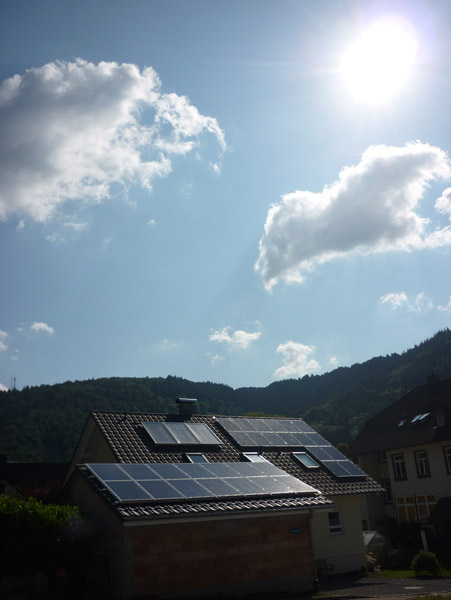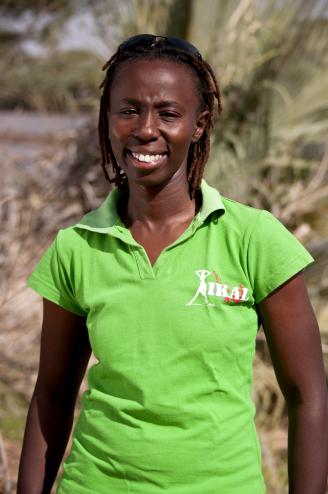The 2012 Goldman Environmental Prize recipients:
photo courtesy Goldman Environmental PrizeAfrica: Ikal Angelei, Kenya
Asia: Ma Jun, China
Europe: Evgenia Chirikova, Russia
Islands & Island Nations: Edwin Gariguez, Philippines
North America: Caroline Cannon, USA
South & Central America: Sofia Gatica, Argentina
As some of you may know, last year I received a last-minute fluke invitation from my friends to attend the Goldman Environmental Prize award ceremony at the Opera House in San Francisco. I didn’t know it at the time, but this inspiring and moving event honoring six grassroots environmental activists from around the world would lead me on an amazing adventure to a remarkable community in Germany’s Black Forest region who against all odds had taken over their local grid from a big power company.
One of the 2011 Goldman recipients, Ursula Sladek, a mother of five and school teacher in the small town of Schönau, had been instrumental in mobilizing her community to take energy conservation matters into their own hands, and since I was going to visit my nearby family last summer, I thought I’d drop her a line to see if I could come for a visit. One thing led to another, and before I knew it I was in Schönau, checking out wind, solar and hydro-electric installations and talking to Ursula and a bunch of others, including the Lutheran pastor whose church’s roof is one of the many solar providers of the co-op.
I still have a few more tales to tell from Schönau and will share some more photos, but here are some articles I published about what a Goldman Prize winner’s town looks like.
The Reluctant Rebels
Sven Eberlein meets the award-winning green energy campaigners now at the forefront of Germany’s new industrial revolution.How to Start Your Own Power Company, Stop Coal and Nukes, and Transform Your City
2011 Goldman Prize winner Ursula Sladek discusses how she became an unwitting energy mogul — and a global environmental hero.Heavenly Energy
In the wake of last year’s Fukushima disaster, German chancellor Angela Merkel announced the country would phase out nuclear power. Churches are at the forefront of Germany’s new solar revolution.
Needless to say I was pretty psyched when the same thing happened again this year and the same invitation was extended to me this Monday (Thanks again Kat & Deidre!). Reading about courageous and inspiring deeds is one thing, but to be able to be there in person when the recipients tell their stories really moves you to tears. This year was no exception, and each one of the 2012 recipients brought down the house with their tales of perseverance in the pursuit of environmental justice against all odds.
So here they are, in order of appearance.
First was Kenya’s Ikal Angelei, who has been fighting against the construction of Gibe 3 Dam to save Lake Turkana, the largest desert lake in the world and lifeline to the hundreds of thousands of indigenous farmers, herders and fishermen who live around it, from drying out. In a story not unlike the Narmada Valley dam in India or China’s Three Gorges dam, this large public works project epitomizes the draining of shrinking resources at the expense of local communities.
To much applause, Ikal came to the podium and shared her story of how she mobilized seemingly powerless local tribes against almighty and moneyed development interests.
photo courtesy Goldman Environmental Prize
Angelei brought together Lake Turkana’s divided and marginalized indigenous communities to fight against the mounting environmental and social implications of the Gibe 3 Dam. She informed elders, chiefs and opinion leaders—all of whom had not heard about the dam—about the project and its implications. In February 2009, local tribes issued a “Lake Turkana People’s Declaration” stating that they had given FoLT the mandate to communicate their grievances regarding the dam.
Angelei took their voices to local members of parliament and the Ministries of Environment, Energy, Water and Irrigation and Fisheries, urging them to reconsider Kenya’s power-purchasing deal with Ethiopia. In response to Angelei’s advocacy, in August 2011, the Kenyan Parliament passed a unanimous resolution for the Kenyan government to demand an independent environmental assessment from Ethiopia. UNESCO’s World Heritage Committee also responded to her appeals by passing a resolution to halt dam construction until further investigation.
Next was Ma Jun, a Chinese journalist who has been calling attention to the devastating environmental toll his country’s air, land and water has taken from the unmitigated pollution brought on by multinational corporations with manufacturing and sourcing operations in China. (Yes, that’s all of us with our squeaky clean gadgets and devices). Ma Jun’s extensive work of making online air and water pollution maps available to the public has played a huge part in calling attention to the devastation and holding foreign companies accountable for their externalized costs. He’s been instrumental in exposing Apple’s lack of supply-chain oversight and the company’s recent shift to clean up its practices.
This is when I started snapping pictures, so you can get a little bit of the live ambiance of these acceptance speeches.
To date, Ma Jun and his team at IPE have exposed over 90,000 air and water violations by local and multinational companies operating in China. Chinese citizens, for the first time in history, have at their fingertips information that reveals which companies are violating environmental regulations across China’s 31 provinces—and with it, the power to demand justice.
Through its Green Choice supply chain program, which has 41 local NGO participants, IPE has encouraged consumers to use their buying power to influence corporate sourcing and manufacturing behavior. Although IPE has no regulatory authority within the government, under Ma Jun’s leadership the organization has succeeded in getting more than 500 companies to disclose to the public their plan and efforts to clean up their facilities. Ma Jun is now working collaboratively with major brands such as Wal-Mart, Nike, GE, Coca Cola, Siemens, Vodafone, H&M, Adidas, Sony, Unilever, Levi’s and Lenovo, all who now regularly reference the maps and self-regulate.
Next up was Sofia Gatica, a working-class mother of three from Ituzaingó in Central Argentina whose story may have been the most gut-wrenching and awe-inspiring one of the night. When you talk about the travesty of losing your child to toxic pesticides, it’s no surprise that Monsanto would be right in the middle of it. Spraying over 50 million gallons of agro-toxins in the soybean fields around Ituzaingó, cancer rates, neurological and respiratory diseases, birth defects, and infant mortality rates were through the roof. While their money, influence and bullying usually lets Monsanto get away with murder, this brave and determined woman organized her community and not only fought to stop the madness in her town but to ban all aerial spraying in Argentina and create buffer zones so that agrochemicals are not used in close proximity to residential areas and waterways.
The Mothers of Ituzaingó brought together environmental groups in Argentina to launch a “Stop Spraying” campaign. They led press conferences, demonstrations and published materials to warn the public about the dangers of pesticides. Gatica also met with research institutions to request scientific studies to confirm what she had observed in Ituzaingó.
Gatica and the mothers’ advocacy has had resounding effects. In 2008, the president of Argentina ordered the minister of health to investigate the impact of pesticide use in Ituzaingó and a resulting study conducted by the Department of Medicine at Buenos Aires University corroborated the mothers’ door-to-door research linking pesticide exposure to public health. Gatica subsequently succeeded in getting a municipal ordinance passed that prohibited aerial spraying in Ituzaingó at distances of less than 2,500 meters from residences. In an unprecedented victory, a 2010 ruling from the Supreme Court not only banned agrochemical spraying near populated areas, but it also reversed the burden of proof—instead of residents proving that spraying causes harm, the government and soy producers must now prove the chemicals are safe.
I loved the next recipient, Evgenia Chirikova, a feisty mother who had settled her family near Khimki Forest, one of the greater Moscow region’s last old-growth forests. When the Russian government announced plans to construct a highway that would connect Moscow and St. Petersburg right through Khimki Forest instead of going around it, she knew something was fishy. Turns out the Putin government is in bed with a multi-billion dollar French construction company with corrupt insider dealings left and right that would funnel all kinds of development money into the pockets of a few investment partners. When they started to mark her beloved trees with red “X’s” Evgenia decided to rally her community for action.
When you hear Evgenia speak, you are not surprised at all that she has stood in front of bulldozers as they were coming in to mow down the forest!
Despite the government’s continued efforts to suppress the movement, Chirikova has succeeded in garnering widespread support from a diverse range of interest groups. Even the Moscow chapter of the Russian Federation of Motorists, an unlikely ally for an environmental group, has joined their efforts to fight the construction project. Defend Khimki Forest’s first rally amassed a crowd of 5,000 people—one of the largest public environmental protests in Russian history—and gathered more than 50,000 signatures.
The most significant victory came when Chirikova and her colleagues convinced the European Bank of Reconstruction and Development and the European Investment Bank, major financial backers of the highway, to withdraw their funding, citing environmental, social and financial concerns about the project.
Edwin Gariguez may be more soft-spoken than Ms. Chirikova, but he is no less passionate and determined in preventing Norwegian mining company Intex from contaminating his island’s water resources and destroying its tropical forests and ecosystem through open-pit nickel mining. Known as “Father Edu,” the Catholic priest from Mindoro, a major island in the northwestern Philippines, took the fight to stop the production of several million tons of toxic waste to the public, including an 11-day hunger strike in 2009 until the federal Department of Environment and Natural Resources (DENR) finally agreed to conduct an investigation into the mine’s environmental and social violations.
Father Edu co-founded the Alliance Against Mining (ALAMIN), a broad coalition of Mindoro residents, elected officials, civil society groups, church leaders and indigenous peoples who oppose mining on the island. Uniting thousands of indigenous peoples, farmers and local and provincial political leaders, Gariguez and his ALAMIN coalition led Mindoro communities in numerous protests. Undeterred by threats of violence and verbal harassment from mining officials and the military—and reeling through the loss of a colleague at ALAMIN who was murdered because of his activism—Father Edu went on to broaden the grassroots movement beyond Mindoro.
In 2002, the local government responded to strong public opposition by passing an island-wide moratorium that required Intex to stop any activities related to large-scale mining. Intex ignored the local ordinance and continued business as usual. This egregious violation of the people’s rights led Father Edu to take his fight overseas, traveling to Europe to address Norwegian parliamentarians and Intex shareholders. In conjunction with a Norwegian NGO, Father Edu filed a complaint with the Organization for Economic Cooperation and Development.
Last but certainly not least, something that hits very close to home. We’ve all shuddered at the continuing attempts by the oil companies and the drill-baby-drill crowd to suck the oil out of the arctic, but nobody speaks as eloquently and powerfully about its dangers and follies as Caroline Cannon, representing 700 Inupiat people of Point Hope, a remote village on the shores of the Chukchi Sea in the Arctic Circle. Accompanied by her extended family, Caroline talked about her people’s love and care for the sea and made an impassioned plea for all of us to keep fighting against several federal offshore oil and gas development leases slated for approval.
The planet’s health is directly proportional to the health of the people most connected to the earth, and the Inupiat’s struggle to protect the region’s marine ecosystems from a catastrophic oil spill is ultimately all of our struggle to restore ecological balance on an overburdened planet.
Caroline Cannon has become the strongest and most consistent voice against the rush to drill in the Arctic seas. She has traveled across Alaska and to Washington, D.C. to attend hundreds of industry meetings and federal summits, representing Point Hope’s concerns about what’s at stake and sharing her deep traditional knowledge of the Arctic marine environment, including whale migration patterns, walrus habitat and the dynamics of ice floe movements in the region.
She became the face of the Inupiat community in a federal lawsuit challenging the 2007-2012 offshore oil and gas development plan. Her representation of Point Hope as a co-plaintiff in the suit was instrumental in bringing the case to victory when, in 2009, a federal court ruled that the proposed oil and gas leases failed to consider the significant impacts to the region’s marine environment. The court’s decision stopped all but one of the proposed major leases. The only one to move forward, Lease Sale 193, was allowed to do so because the federal government’s actual sale of the lease occurred before the lawsuit began. Cannon and her partners are now challenging that lease in federal court.
Once again, all six of this year’s Goldman Prize recipients not only brought tears to my eyes but inspired me to continue to shed light on the many people all over this beautiful planet who fight for an inhabitable planet for coming generations of human and all other species. Reading the news these days can be pretty depressing and perhaps even leave you feeling hopeless, but when you get in real life contact with the people who stand up to ignorance, greed and short-sightedness you realize you’re not alone.
I’m not sure if I’ll see any of this year’s winners again, but I can already say that they’ve not only lifted my spirit but recharged my batteries in the long and winding journey to make the impossible possible.











Thank you so much for bringing their work to our attention!
Thanks, Sven for this; I’m posting a link to these inspiring stories and your inspired writing.
[…] https://svenworld.com/2012/04/19/six-extraordinary-people-who-are-giving-voice-to-the-voiceless-and-h… Share this:PrintEmailFacebookTwitterMoreLinkedInStumbleUponPinterestTumblrRedditDiggLike this:LikeBe the first to like this post. […]